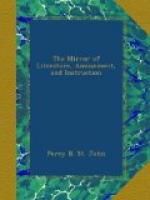And how are all these immense advantages to be effected?—By the substitution of inanimate for animate power. At present, the animate power employed in the commercial transportations of this great kingdom is estimated to amount to two millions of horses: each horse consumes as much food as is necessary for the support of eight men. Hence the conversion of its consumption to purposes of human existence would, if carried to this practical extent, amount to a quantity of food equal to support sixteen millions of people.
Where the product is so enormous—so vastly beyond our immediate necessities—it is not requisite to go into any minutiae of detail. To calculate all the gains we will leave to the political economist, as also to bring the matter out in its fair proportions; but to establish the matter clearly within the bounds of a safe, an easy, and practical issue, we have merely to state, that a conversion of food from a physical to a moral purpose, adequate to the supply of one-fourth part of the above aggregate estimate, that is to say, to four millions, is amply sufficient to relieve us at the present moment from that pressure of pauperism which sits like an incubus upon the energies of the nation, and which will precipitate us, if not timely avoided, into speedy and irretrievable ruin.
Now the suppression of the stage-horses upon our principal thoroughfares, and of the dray-horses in the great commercial towns, may be calculated to economize a saving of food equivalent to the supply of the above number of human beings.
It is, perhaps, not superfluous to remark, that the amount of food, equal to the supply of the said four millions, is not the produce of an extended agriculture and proportionate outlay, but is just that part of the annual produce of the country, subtracted from the whole, which is at present required for the mere purpose of transportation—i.e. to feed the animals used for draught,—and is consequently a dead loss as unproductive capital.
In addition to the evil arising from such a consumption of unproductive food, is also to be considered the very great loss consequent upon the heavy capital sunk in horse purchase. Were this viewed, as properly it ought, as money withheld from other purposes of trade, and which might be more advantageously invested, our capitalists and men of science would not oppose the substitution of inanimate for animate power in the way they have done. Neither, did the landed interest maturely weigh the varied benefits it will produce in agriculture, would they view it in the light of an invasion upon their respective interests. They do not give a quid without receiving a quo every way as valuable. The reduction of farm consumption—the bugbear of the project—will be met and compensated by a steady and proportionate demand from other quarters. Whilst in the United Kingdom, the 8,100,000 acres of land now required to feed the horses, together with the capital sunk in their purchase, will, when both applied to other and general purposes, amply compensate for the exchange.




